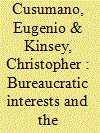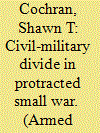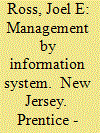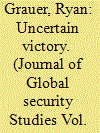|
|
|
Sort Order |
|
|
|
Items / Page
|
|
|
|
|
|
|
| Srl | Item |
| 1 |
ID:
141165


|
|
|
|
|
| Summary/Abstract |
In spite of its sensitivity, diplomatic protection has received very sporadic scholarly attention. This article provides a comparative analysis of US and UK diplomatic security policies, focusing on the increasing use of private military and security companies (PMSCs) for the protection of foreign service and development agencies’ personnel. The existing theoretical explanations of the privatization of security tasks cannot explain why countries displaying similar material incentives and similar political and market cultures have outsourced diplomatic protection to different degrees, nor can they account for variance in the use of PMSCs by different agencies within the same country. Our analysis highlights the importance of investigating organizations’ interests in providing a more accurate explanation of the varying propensity to outsource armed protection. In both the United States and the United Kingdom, the outsourcing of diplomatic security was a resultant of foreign policy bureaucracies and military organizations’ preferences.
|
|
|
|
|
|
|
|
|
|
|
|
|
|
|
|
| 2 |
ID:
127811


|
|
|
|
|
| Publication |
2014.
|
| Summary/Abstract |
This article examines the basis of military leadership preferences toward war termination, and thus the basis of the associated civil-military divide, within the context of protracted small war. The conventional wisdom posits military leadership preferences as a near-constant in favor of persistence and thus expects a dominant pattern of military obstructionism. However, such a pattern does not hold empirically across the population of small wars. This gap between expectation and evidence derives at least in part from the limits of the bureaucratic-organizational model, focused on the military's desire for resources, autonomy, and influence, that underlies the conventional wisdom. In contrast, this article suggests an alternative model privileging the demands of institutional legitimacy. The legitimacy motive as conceptualized here is particularly salient to the small war context. It accordingly provides a foundation for better understanding variation in military leadership preferences toward war termination and thus variation in the direction and intensity of the civil-military divide.
|
|
|
|
|
|
|
|
|
|
|
|
|
|
|
|
| 3 |
ID:
032446


|
|
|
|
|
| Publication |
New Jersey, Prentice - Hall, 1970.
|
| Description |
xvi, 322p.Hbk
|
| Standard Number |
135486289
|
|
|
|
|
|
|
|
|
|
|
|
Copies: C:1/I:0,R:0,Q:0
Circulation
| Accession# | Call# | Current Location | Status | Policy | Location |
| 005694 | 658.4038011/ROS 005694 | Main | On Shelf | General | |
|
|
|
|
| 4 |
ID:
128785


|
|
|
| 5 |
ID:
076861


|
|
|
|
|
| Publication |
2007.
|
| Summary/Abstract |
The UN has been accused of hypocrisy - failing to act in accordance with the ideals it espouses - in post-Cold War peacekeeping missions. This article argues that such inconsistency can arise from 'organized hypocrisy', a phenomenon identified by organization theorists in which organizations respond to conflicting pressures in external environments through contradictory actions and statements. Organized hypocrisy may have both positive and negative effects on peacekeeping. On the one hand, it may produce or exacerbate gaps between commitments and resources, undermine reforms if they are decoupled from practice, and impede efforts to mitigate harmful peacekeeping externalities. On the other hand, organized hypocrisy may enable the UN, or regional organizations, to manage irreconcilable pressures that might otherwise render the organization incapable of effective action and threaten its survival. This article explains and develops the concept of organized hypocrisy, and apples it to post-Cold War peace operations.
|
|
|
|
|
|
|
|
|
|
|
|
|
|
|
|
| 6 |
ID:
152708


|
|
|
|
|
| Summary/Abstract |
War, as Clausewitz reminds us, is fought in the domain of uncertainty. Human nature, friction, and chance combine to create a fog that shrouds both friendly and enemy activities. Accordingly, effective warfighting is as much a product of information gathering and processing as deliverance of kinetic energy. Existing theories of military power, however, privilege the latter over the former. This paper seeks to address this imbalance and push forward scholarly understandings of martial capability by advancing a new framework for thinking about the way in which militaries’ capacities to manage uncertainty condition their abilities to generate combat power. The manner in which militaries organize their command and control structures is identified as a key factor in the management of uncertainty, and its role in facilitating both information management and the generation of martial strength is theorized. The command structure theory advanced is provisionally assessed through an examination of a key battle in the Russo-Japanese War—an engagement that Japan won but, by all conventional measures of military power, it should have lost. The paper concludes with a discussion of open questions raised by the claim as well as scholarly and policy implications.
|
|
|
|
|
|
|
|
|
|
|
|
|
|
|
|
|
|
|
|
|